|
Saturdee Opry
Links # 136: Half-Assed Edition
Half an ass is better than none, I always say. Six dozen of one,
half an ass of another! If you glean that these selections were made without
much thought, you are very canny. Still, you are free to find joy, beauty,
absurdity, wonderment---or to be bored out of your mind, whichever occurs first.
Strange opera overture! Weird July 4 tributes to France! Long-lost bel canto
baritone! Little-known Irish mezzo! The entire act one of "Carmen!" The crazy
Pretty Yende matter! Annnnd. . .Go see Siggy! Visit the dead city! Plus: Opera
Desecration of the Day! And finally. . .you want fireworks? It's all half-assed
here.
https://www.youtube.com/watch?v=WRK03q76GKU
Saturdee Opry Links Overture!
Mascagni conducts his own overture to the now largely forgotten work, "I Rantzau."
1927.
https://www.youtube.com/watch?v=dAAjF-q-xFM
About the opera:
https://www.gramophone.co.uk/review/mascagni-i-rantzau
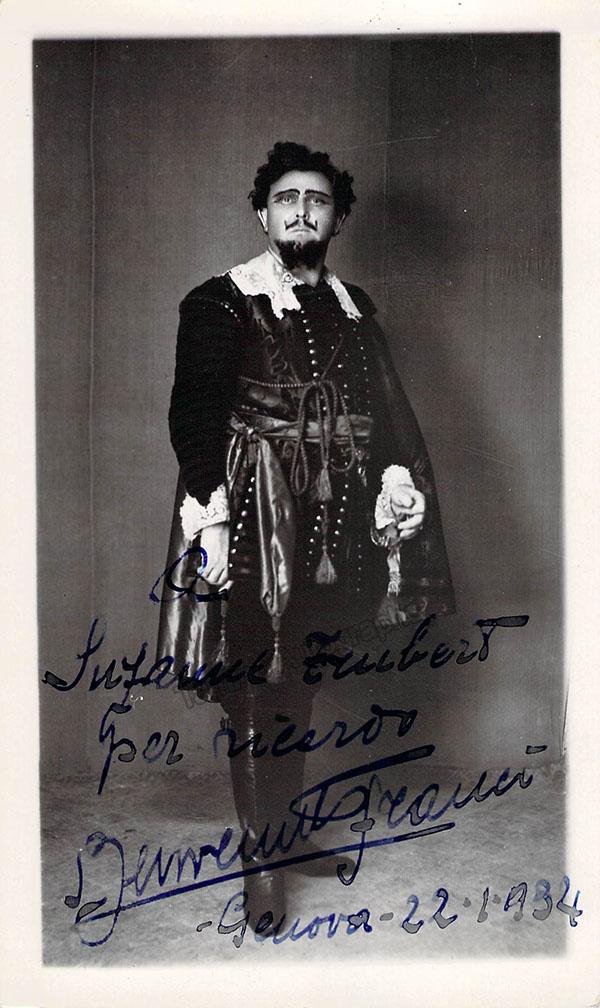
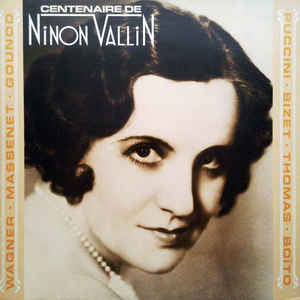

Benvenuto Franci
Ninon Vallin
Siegfried Jerusalem
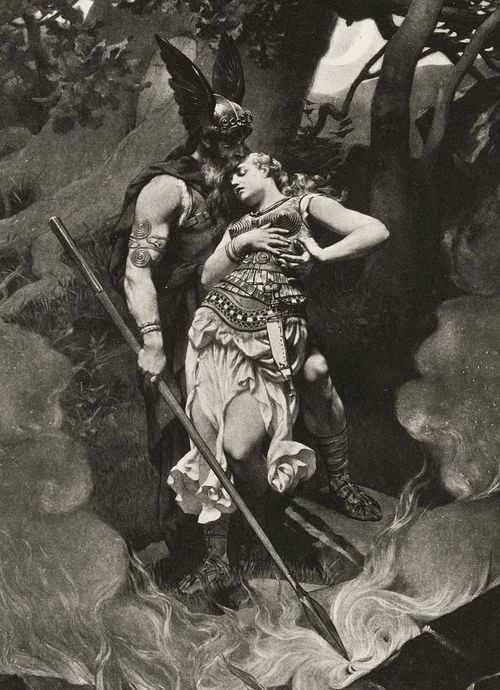
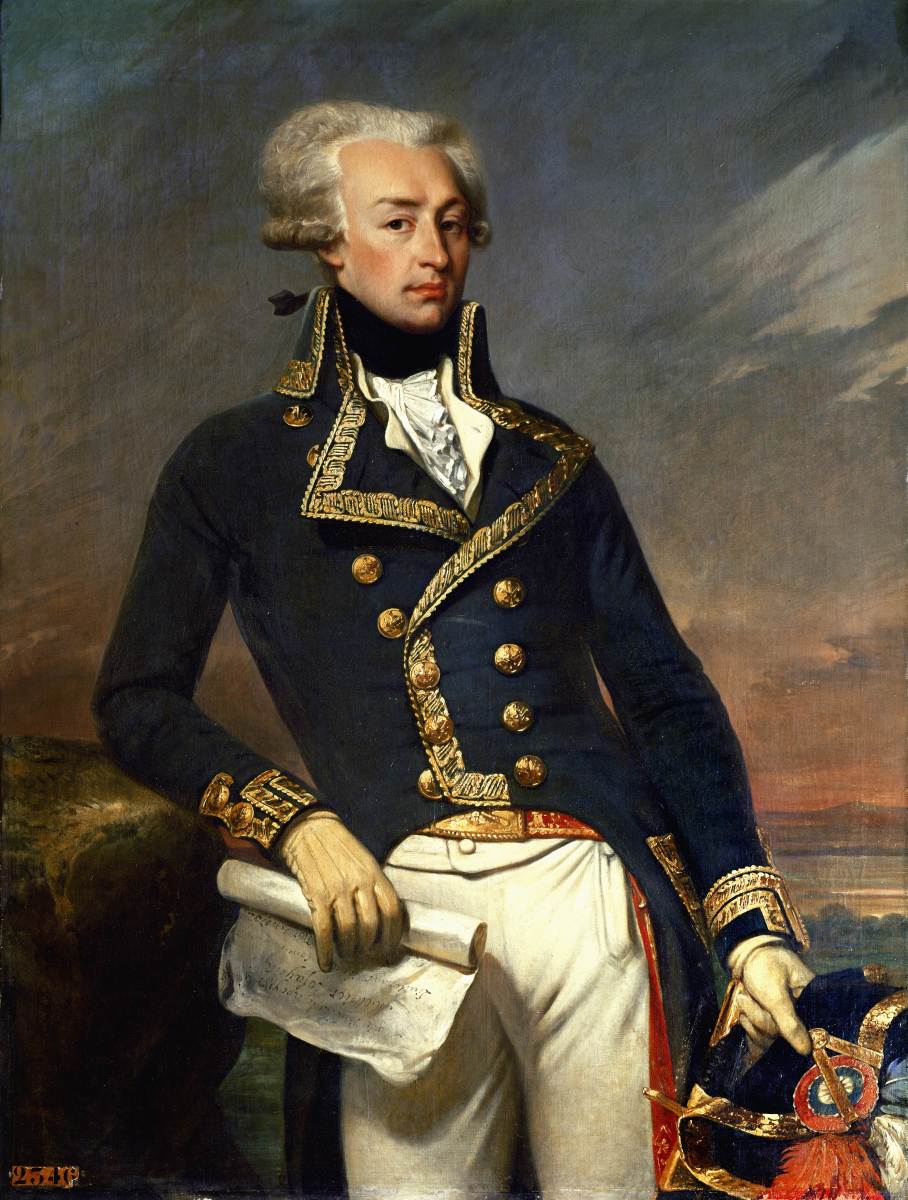

Wotan and Brunhilde
Lafayette
Pretty Yende
1.
After today's Mascagni overture from 1927, with Mascagni himself conducting,
might as well stay in the past. It's much more attractive, in so many ways, than
the present, eh? Here is a forgotten baritone who, in fact, once sang a role in
a world premiere opera by Mascagni, "Il Piccolo Marat." This is one Benvenuto
Franci, a man with an opulent, resonant voice. He was quite content to spend his
30-year career in Europe, singing bel canto, Verdi, verismo roles---and,
happily for us, made a number of recordings. Here is his touching rendition of
the aria, "Vien Leonora," from Donizetti's "La Favorite." A little love song. .
.
https://www.youtube.com/watch?v=mX8eyiCv02o
Setting: the gardens of the king's palace, Castile, Spain, circa 1340
Synopsis: The king sings of his love for his mistress, Léonore.
Bad translation:
https://www.opera-arias.com/donizetti/la-favorita/vien-leonora-a-piedi-tuoi/
Just to give you an idea of how vocal character and interpretation can affect an
aria, here is the same piece sung by the great Dmitri Hvorostovksy. Note how it
sounds comparatively heroic, and, while beautiful, finishes a distant second to
Franci in terms of sheer beauty. Hvorostovksy's rendition feels like a
performance; Franci's feels like a song.
https://www.youtube.com/watch?v=vhCVwabGXTc
2.
Q. But Rip, tomorrow is July 4! Aren't you going to devote SOL to it?
A. No, I am not. This holiday has long become a grotesque commercial cash-in, a
slovenly excuse to barbecue and eat billions of dead animals, get shitfaced,
and, of course, recklessly set off fireworks. It does not, in short, exactly
manifest dignity or intelligence. Patriotism? July 4th is now long on jingoism,
practically devoid of anything resembling patriotism. Unless idiots in black
cowboy hats warbling "America the Beautiful" happen to be your cup of tea. . .I
will, however, give a little nod to France(!), which offered much invaluable
support during the American Revolution. . .And so we turn to another baritone,
Michel Dens, born in Paris in 1911, known for French repertory---including much
operetta fare. Here, from Franz Lehar's "The Land of Smiles," is the chestnut, "Dein
ist mein ganzes Herz" ("Yours is My Heart Alone"), but sung winningly in French.
"Je t’ai donné mon coeur." Play it twice. You'll feel good.
https://youtu.be/yCeKpGeEMNI
About the song:
https://en.wikipedia.org/wiki/Yours_Is_My_Heart_Alone
About Michel Dens:
https://en.wikipedia.org/wiki/Michel_Dens
3.
Salut à la france! That's our concession to July 4. After all, Jefferson and
Franklin lived at great length in France, were fluent in the language, deeply
loved the culture. Jefferson and Lafayette, of course, aided and abetted one
another's respective revolutions. So we owe a great debt to France, but tell
that to the Amerrygun idjits who came up with "Freedom Fries" because France
opposed our rape of Iraq. Urp. Sorry. Well. . .here is the forgotten French
soprano, Ninon Vallin, with a shimmering rendition of the exquisite aria, "Depuis
Le Jour," from "Louise," by Charpentier. An exultation of love. Mademoiselle
Vallin began her career, by the way, strictly as a concert specialist, with no
ambition to sing opera! And she excelled. Debussy more or less drafted her to
premiere the soprano role in his oratorio, "The Martyrdom of St. Sebastian," and
she later worked closely with the underrated composer, Albert Roussel, and other
French composers of the early 20th century noted for art song. Luckily for all,
she eventually changed her mind and went on to a long, fulfilling operatic
career that took her to La Scala, Buenos Aires, San Franciso, and Paris. Bien
fait!
https://youtu.be/HqPQtKLWgs8
Setting : a small garden next to the Montmartre, Paris, 1900
Synopsis : Louise describes how her life has changed since moving in with Julien.
She revels in his love for her and her life which grows better every day.
Translation:
http://www.aria-database.com/translations/louise03_depuis.txt
And I sort of hate to do this to Ninon Vallin, but Monserrat Caballe's rendition
of this aria is just beyond belief:
https://www.youtube.com/watch?v=rlvQNZJaqQ0
4.
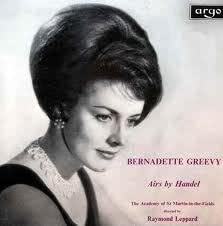
Not every opera singer makes it as an opera singer. The Irish mezzo-soprano,
Bernadette Greevy, set out for the operatic stage, and mostly wound up on the
concert stage instead. Sort of the opposite of Ninon Vallin! It wasn't her
voice, it was her lack of acting chops, that mostly "confined" her to song
recitals and oratorios---where she made a substantial mark with Mahler, Handel,
Bach, Haydn. Also probably at the expense of her career, she spent her life
close to her native Dublin, foregoing the peripatetic singing life she might
have enjoyed. Here she is, for a palate cleansing change of pace, with the
brisk, upbeat aria, "Duty, Justice, Love" ("Dover, giustizia, amor") from
Handel's opera, "Ariodante." Get ready for melisma. (Note: baroque operas were
so much stand-and-sing that they might as well have been oratorios, and are
often performed as such.)
https://www.youtube.com/watch?v=eKF9hqf-TGo
Translation:
https://www.lieder.net/lieder/get_text.html?TextId=124715
5.
Yes, we are making it up as we go along today, going strictly on half-assed
impulse. What's that? You could do with a little pageantry, gaiety, melody? Me,
too. What? You've never been to an opera? You've never even seen "Carmen?" Well.
We take you now to the Teatro Antico in Taormina, Sicily, for a modest, winning
little staging of Bizet's great work. This is the entire act one, complete with
Anglais subtitles and "hit songs." Watch a little, watch it all. . .hum along. .
.And remember, this was quite the controversy in its day, widely
condemned---yes, condemned---for showing women smoking (well they work in a
cigarette factory, so whaddya 'speck?), "low-life characters," and, gasp, erotic
obsession. Poor Bizet died of a heart attack at 36, never living to see his
opera acclaimed as a masterpiece.
https://www.youtube.com/watch?v=Ut6YzGn1vCQ
SOL EXTRA: The story of "Carmen"
https://www.classicfm.com/composers/bizet/guides/story-georges-bizets-carmen/
6.
The Pretty Yende situation is basically this: she thought her Italian residency
permit covered her entrance to France (from South Africa), where she was
appearing in Bellini's "La Sonnambula." She either was wrong, or ran into an
immigration agent who didn't know this (or, yes, who was racist) and insisted
that she needed a French Visa. So she was detained and strip-searched, as is
done routinely with persons suspected of trying to enter a country illegally.
Was she singled out because she is black? She thinks so, and has been angrily
posting along these lines. What's more, she claims that her paperwork was in
order, yet acknowledges that she did not have a French Visa. Chances are, an
apology will be made because she is a prominent personage, whether she was right
or wrong. These are the times in which we live, folks. Immigration agents are
not necessarily very smart, and they don't necessarily know all the rules. They
are trained to take extreme action for the slightest reason, erring on the side
of AVERTING TERRORISM. Ms. Yende should understand this. Whether there was
racism here has not yet been determined. If there was, the officer(s) involved
should be removed and prosecuted, obvious to say. If not, well. . .Here she is
in a selection from "La Sonnambula," by Bellini, in which she just appeared with
Paris Opera. This is "Ah! Non Credea Mirarte," a touching paean to dead flowers.
(Start at 5:50.)
https://www.youtube.com/watch?v=9gCHFV3ymd8
Setting: Near the mill in a Swiss village, early 19th century
Synopsis: While sleepwalking, Amina prays for Elvino and then sings her sorrow.
She remembers the engagement ring that he took from her when he believed she was
unfaithful to him.
Translation:
http://www.aria-database.com/search.php?individualAria=678
About the new production:
https://www.youtube.com/watch?v=cX8C8xxeoVg
7.
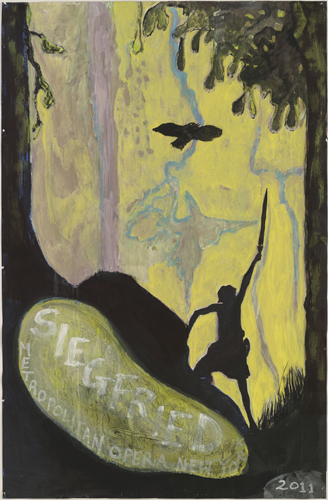
Need a sword forged? Go see Siggy! "Have hammer, will swing." Ask about his
lay-away plan! Tenemos Pentothal! If he can't forge a sword for you, he'll eat a
bug! Just follow the Forest Bird through the woods along the banks of the Rhine
River until you hear lots of clanging and singing. That's Siggy! "Nothung!" Ask
for it by name! Sigh. Okay, you want an actual summary? Here you go:
"Siegfried," by Wagner. Scene 3:
The fiendish dwarf, Mime, despairs as he imagines the ferocity of the dragon
Fafnir, while "the orchestra paints a dazzling picture of flickering lights and
roaring flames". Siegfried returns and is annoyed by Mime's lack of progress in
re-forging the magic sword, "Notung," from its shattered parts. Mime realizes
that Siegfried is "the one who does not know fear" and therefore the only one
who can re-forge the sword. He also realizes that unless he can instill fear in
him, Siegfried will kill him as has been foretold. So he tells Siegfried that
fear is an essential craft, and the naive young Siegfried is eager to learn it.
Mime promises to teach him by taking him to Fafnir, who will scare the crap out
of anyone. Since Mime was unable to forge Notung, Siegfried finally decides to
do it himself. He succeeds by shredding the metal, melting it, and casting it
anew, singing the fearsome aria, "Notung!" In the meantime, good ol' Mime brews
a poisoned drink to offer Siegfried---after Siggy has killed the pesky dragon.
After he finishes forging the sword, Siegfried demonstrates its strength by
chopping the anvil in half with it. There you go, kiddies, have a good time with
the bebop tango. The tenor is Siegfried (yes, really) Jerusalem (yes, really.)
Mit der Englischen subtitlen.
https://www.youtube.com/watch?v=JwP5dkfGmlI
AND, IF YOU WANT TO SEE WHAT LEADS UP TO THIS:
https://www.youtube.com/watch?v=nRJApVjvxJE
8.
Yes, continuing with our Half-Assed Edition of SOL. (Right, we could only find
half our ass today. The other half was kidnapped by the inanity and insanity of
the world.) Here is an excerpt from the fine 20th Century opera, "Die Tote Stadt,"
by Erich Wolfgang Korngold (yes, the movie composer.) "Die Tote Stadt"
translates to "The Dead City," you know, like Los Angeles. This is the lilting,
poignant aria, "Gluck, das mir verblieb," or "Joy (Luck), that near to me
remained," AKA "Marietta's Lied." It has become a staple of concert repertory
for male and female. Here it is sung live to piano accompaniment by the
incomparable Renee Fleming. So fragile that it almost breaks.
https://www.youtube.com/watch?v=aGyt7yIJP94
Translation:
https://en.wikipedia.org/wiki/Gl%C3%BCck,_das_mir_verblieb
Role: Marietta, a dancer and the leader of a performing troupe, also greatly
resembles Paul's dead wife, Marie
Setting: Paul's room devoted to his dead wife Marie, Brussels, late 19th century
Synopsis: The "dead city" in the opera's title is Bruges, Belgium, identified in
the opera with Marie, the dead wife of Paul. At the start of act 1, Paul
confides in a friend the extraordinary news that he has seen Marie, or her
double, in the town and that he has invited her to the house. She arrives, and
Paul addresses her as Marie, but she corrects him: she is Marietta, a dancer
from Lille. He is enchanted by her, especially when she accepts his request for
a song, "Glück, das mir verblieb". The words tell of the joy of love, but there
is a sadness in it also because its theme is the transitoriness of life. Their
voices combine in the verse which extols the power of love to remain constant in
a fleeting world.
AND, FOR CONTRAST, here is the great tenor, Joseph Schmidt, with the same aria!
Right, Schmidt, who was denied a stage career because he was 4' 10" or so, and
was later driven to an early death while fleeing Hitler.
https://www.youtube.com/watch?v=Von_m99u5B4
9.
Opera Desecration of the Day! A new SOL feature! Today, we feature the Royal
Opera, which just loves to desecrate the art form with asinine, silly,
pretentious, pseudo-intellectual productions---chief among them the "Carmen"
staged entirely on bleachers, with "Carmen" herself in a gorilla suit. (No, I
don't know why, either.) Here is a close second, however---the notorious Verdi
potboiler great, "Il Trovatore." Specifically, the famed anvil chorus. This is
supposed to be a gypsy camp in the 15th century. Someone apparently felt that it
needed to be "updated" (a current mania in all aspects of culture, by the way.)
Never mind that this horribly conflicts with the story, making its events even
more preposterous. Of course, you might like it! With English subtitles.
https://www.youtube.com/watch?v=-8aHsJdMEMY
FINAL BOW:
You want fireworks, kiddies? Here you go. The "Magic Fire" music from Wagner's
"Die Walkure," the second in the "Ring" cycle series of four operas. To unfairly
summarize. . .
Brunhilde, the favorite goddess daughter of the king of the gods, Wotan, has
disobeyed Daddy. He instructed her to stay out of ongoing world affairs, but
instead she intervened to effect the rescue of one mortal, Sieglinde, after
trying to prevent the death of her beloved (and, unknowingly, her brother),
Siegmund. Why did she do this? Because she knew her old man's true heart, unlike
his controlling hardass wife, Fricka (long story.) So Brunhilde did what Wotan
wanted to do, though he had had decreed otherwise. Wotan captures Brunhilde, and
says he will strip her of her godhead, rendering her a helpless mortal, prey to
other mortals. She pleads with him in the glorious sequence, "Wotan's Farewell,"
and he grants her wish that only a man who knows no fear---a hero---may rescue
her. To ensure this, Wotan summons the god of fire, Loge, and instructs him to
surround Brunhilde with a magic fire that may only be crossed by the greatest of
heroes. This is that moment, in a thoughtfully illustrated video sequence. The
tremendous music is the Vienna Philharmonic, conducted by Georg Solti, and the
bass-baritone is the great Hans Hotter.
https://www.youtube.com/watch?v=wt_AH8-Tijc

James Morris as Wotan
Back to Opera Links
Back to Home Page
|



